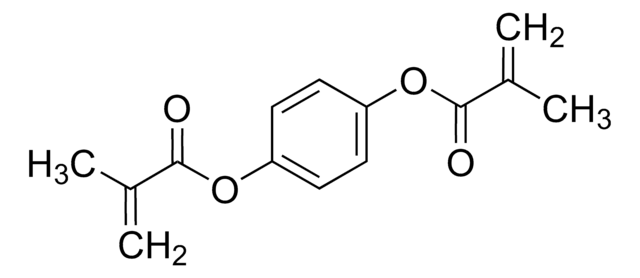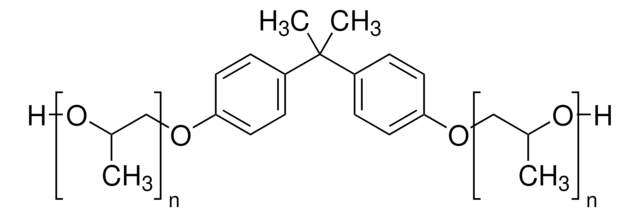411167
Bisphenol A glycerolate (1 glycerol/phenol) diacrylate
contains MEHQ as inhibitor
Synonym(s):
2,2-Bis[4-(3-acryloyloxy-2-hydroxypropoxy)phenyl]propane, 2,2-Bis[acryloyloxy(2′-hydroxypropyloxy)phenyl]propane, Bisphenol A glycerolate diacrylate
About This Item
Recommended Products
contains
MEHQ as inhibitor
250-500 ppm MEHQ as inhibitor
refractive index
n20/D 1.557 (lit.)
viscosity
2000-4000 cP(65 °C)(lit.)
acid number
<5 mg KOH/g
density
1.18 g/mL at 25 °C (lit.)
SMILES string
CC(C)(c1ccc(OCC(O)COC(=O)C=C)cc1)c2ccc(OCC(O)COC(=O)C=C)cc2
InChI
1S/C27H32O8/c1-5-25(30)34-17-21(28)15-32-23-11-7-19(8-12-23)27(3,4)20-9-13-24(14-10-20)33-16-22(29)18-35-26(31)6-2/h5-14,21-22,28-29H,1-2,15-18H2,3-4H3
InChI key
VZTQQYMRXDUHDO-UHFFFAOYSA-N
Related Categories
Application
Features and Benefits
Physical form
Signal Word
Warning
Hazard Statements
Precautionary Statements
Hazard Classifications
Skin Sens. 1
Storage Class Code
10 - Combustible liquids
WGK
WGK 3
Flash Point(F)
235.4 °F - closed cup
Flash Point(C)
113 °C - closed cup
Personal Protective Equipment
Certificates of Analysis (COA)
Search for Certificates of Analysis (COA) by entering the products Lot/Batch Number. Lot and Batch Numbers can be found on a product’s label following the words ‘Lot’ or ‘Batch’.
Already Own This Product?
Find documentation for the products that you have recently purchased in the Document Library.
Customers Also Viewed
Our team of scientists has experience in all areas of research including Life Science, Material Science, Chemical Synthesis, Chromatography, Analytical and many others.
Contact Technical Service











